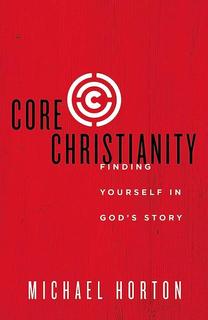Dr. Michael Horton shares his top 10 books and why he loves them.
1. City of Godby St. Augustine
When the Vandals sacked Rome, church father Jerome said, "What is to become of the Church now that Rome has fallen?" by contrast, Augustine responded, in effect, "Now God has brought the mission field to the missionaries!" But paganism was still alive and well in the Roman empire and people were saying that the defeat was because the gods were abandoned. Augustine's sweeping response, distinguishing the City of God and the City of Man, is said justly to have been the first Christian interpretation of Western history up to that point. Readers can't miss parallels with our own time.
2. Galatians (Commentary) by Martin Luther
Recovering the doctrine of justification was at the heart of the Reformation. This 1535 commentary can reorient your whole Christian life.
3. Institutes of the Christian Religion by John Calvin
Calvin was a very organized thinker, drawing from the whole range of Scripture, the best of the ancient church and even the "better theologians" of the medieval period. Addressed to the Catholic King of France, it was written as an introduction to the basic teaching of the Reformation. I used to read it for my devotions and now I keep returning to it to find new deposits of gold.
4. The Heidelberg Catechism
Introducing new candidates for baptism to the Christian faith, the ancient church developed question-and-answer "catechisms" (meaning "teaching tools"). The Reformers revived this practice after Luther discovered that nobody knew even the Apostles' Creed, the Lord's prayer or the Ten Commandments. The Heidelberg is the most pastoral and accessible of the Reformed catechisms, in my humble opinion. Question 1: "What is your only comfort in life and in death?" "A. That I am no my own, but belong, both in body and soul, to my faithful Savior Jesus Christ…" Memorize the full answer (with its scriptural proofs) and it will sustain you all the way to your death bed.
5. Moby Dick by Herman Melville
It's good sometimes to listen to those who, though raised in the church, have turned against it. Isn't that what's happening today for so many? They might get it wrong, but what do they hear us saying? That's always a good exercise. This work takes aim at a view of God that many have found oppressive rather than liberating.
6. Miracles by C. S. Lewis
So what do you say when someone asks you, "Do you really believe miracles happen?" Anything by Lewis is pure gold, but this little book is the most succinct and persuasive. The Oxford don reasons with the reader: "If anything extraordinary seems to have happened, we can always say that we have been the victims of an illusion. If we hold a philosophy which excludes the supernatural, this is what we always shall say." He explains, "Christianity does not involve the belief that all things were made for man. It does involve the belief that God loves man and for his sake became man and died." Read it and give this to a non-Christian (or struggling Christian) friend.
7. Brothers Karamasov by Fyodor Dostoevsky
Just read Book 5 and you'll want to start at the beginning. Here is someone who is wrestling with Nietzsche & Co. (nihilism-meaninglessness), including the suffering in his own life, who is nevertheless struggling throughout the novel to cling to his faith in Christ. If you read this after the other books I've recommended, it will blow you away. It's filled with typically Russian lunacy, clarity and verve.
8. The Holiness of God by R.C. Sproul
I'm sitting in the audience at the Evangelical Free Church of Fullerton, in California, where Sproul is giving the "Holiness of God" lectures that became his book. Going through this series is like being dragged into a story that you never even knew was possible. The interpretation of Isaiah 6 is wonderful and "Luther's Insanity" is about the best grasp of what the Reformer was all about as anything I've encountered.
9. Soul Searching: The Religious and Spiritual Lives of American Teenagers by Christian Smith
Not only literature, but sociology, helps us to understand where we are right now. If you care about your kids, and grandchildren, and wonder why-in spite of the fact they go to church and are involved in youth activities-they don't seem to be Christians, read this book.
10. Hamlet by William Shakespeare
I loved him in college, but a seminary at Yale with the great literary scholar Harold Bloom was like starting over. Along with the Geneva Bible and KJV, much of the modern English language is shaped by the bard. Countless expressions we use every day come from his plays and sonnets. Today we think of his plays as "high culture," but in his day they were folk culture. Not just entertainment (though definitely that!), they're penetrating studies in human nature.
This list originally appeared in the August 2019 Update magazine of Ambassador.






